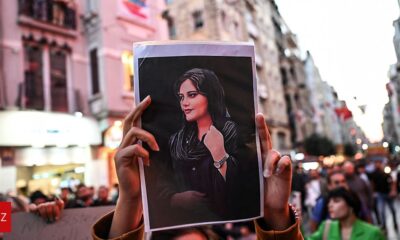Eight reported killed as Iran protests spread over woman’s death

At least eight people have been killed by
Wednesday in a crackdown on protests in Iran over the death of Mahsa Amini
after the young woman was arrested by morality police, according to a
combined toll.
Public anger has flared in the Islamic republic since authorities on Friday
announced the death of 22-year-old Amini, who had been held for allegedly
wearing a hijab headscarf in an “improper” way.
Activists said the woman, whose Kurdish first name is Jhina, had suffered a
fatal blow to the head, a claim denied by officials who have announced an
investigation.
Some women demonstrators have defiantly taken off their hijabs and burned
them in bonfires or symbolically cut their hair before cheering crowds, video
footage spread virally on social media has shown.
“No to the headscarf, no to the turban, yes to freedom and equality!”
protesters in Tehran were heard chanting in a rally that has been echoed by
solidarity protests abroad, including in New York and Istanbul.
Iranian state media reported on Wednesday that, in a fifth night of street
rallies that had spread to 15 cities, police used tear gas and made arrests
to disperse crowds of up to 1,000 people.
London-based rights group Article 19 said it was “deeply concerned by reports
of the unlawful use of force by Iranian police and security forces” including
the use of live ammunition.
Demonstrators hurled stones at security forces, set fire to police vehicles
and garbage bins and chanted anti-government slogans, the official IRNA news
agency said, adding that rallies were held in cities including Mashhad,
Tabriz, Isfahan and Shiraz.
“Death to the dictator” and “Woman, life, freedom”, protesters could be heard
shouting in video footage that spread beyond Iran, despite online
restrictions reported by internet access monitor Netblocks.
Iran’s supreme leader Ayatollah Ali Khamenei spoke publicly without
mentioning the spreading unrest on Wednesday, before ultra-conservative
President Ebrahim Raisi began addressing the UN General Assembly in New York.
Also at the UN, British Foreign Secretary James Cleverly told AFP that “the
Iranian leadership should notice that the people are unhappy with the
direction that they have taken. There is another path that they could take.”
– ‘Significant shock’ –
The wave of protests over Amini’s death “is a very significant shock, it is a
societal crisis,” said Iran expert David Rigoulet-Roze of the French
Institute for International and Strategic Affairs.
“It is difficult to know the outcome but there is a disconnect between the
authorities with their DNA of the Islamic revolution of 1979 and an
increasingly secularised society.
“It is a whole social project that is being called into question. There is a
hesitation among the authorities on the way forward with regard to this
movement.”
Protests first erupted Friday in Amini’s home province of Kurdistan, where
governor Ismail Zarei Koosha said Tuesday three people had been killed in “a
plot by the enemy”.
Kurdistan police commander Ali Azadi on Wednesday announced the death of
another person, according to Tasnim news agency.
Two more protesters “were killed during the riots” in Kermanshah province,
the region’s prosecutor Shahram Karami was quoted as saying by Fars news
agency, blaming “counter-revolutionary agents”.
Additionally, the Norway-based Kurdish rights group Hengaw said two
protesters, aged 16 and 23, had been killed overnight in West Azerbaijan
province.
An additional 450 people had been wounded and 500 arrested, the group said —
figures that could not be independently verified.
– ‘Enemy plot’ –
Video spread online showing security forces opening fire on protesters in the
southern city of Shiraz, where protests continued into the early hours of the
morning.
Amini’s death and Iran’s response to the protests have sparked condemnation
from the United Nations, United States, France and other countries.
The protests are among the most serious in Iran since November 2019 unrest
over fuel price rises.
Foreign ministry spokesman Nasser Kanani on Tuesday condemned what he called
“foreign interventionist positions”.
“It is regrettable that some countries try to take advantage of an incident
under investigation as an opportunity to pursue their political goals and
desires against the government and people of Iran,” he said.
Iran’s Telecommunications Minister Issa Zarepour on Wednesday warned of
internet restrictions, citing the “security issues of these days,” ISNA news
agency said.
Article 19 said it was “alarmed by the local internet shutdowns”, recalling
that in 2019 authorities had “used the darkness of a shutdown to kill, maim
and arrest protesters and bystanders with impunity”.
AFP











